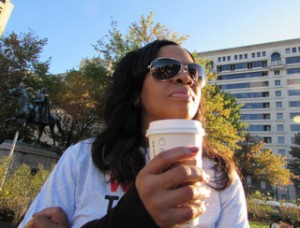Yvonne Jackson of Washington, D.C. remembered holding her younger brother’s hand in 2012 as he lay dying in a hospital bed in Los Angeles.

Yvonne Jackson takes part in Saturday’s Walk to End HIV in honor of her younger brother, Terrence Keith Richard.
Her brother, Terrence Keith Richard, 37, was dying of complications from AIDS. He had contracted HIV 12 years earlier after having unprotected sex with another man, she said.
She comforted her brother in his final moments by singing “Jesus loves me,” a song familiar to them both from childhood.
“And he took his last breath,” Jackson, 44, said.
Jackson walked in remembrance of her baby brother Oct. 25 during the Walk to End HIV, formerly known as the AIDS Walk Washington.
The event was held at Freedom Plaza in the District and attracted more than 5,000 walkers and runners who raised roughly $600,000 for Whitman Walker-Health, a community health center in Northwest, along with 12 community partners said Dave Mallory, the walk’s director.

Yvonne Jackson, who walked in honor of her younger brother, Terrence Keith Richard, joins nearly 5,000 people in the District for the Walk to End HIV.
Not only did Whitman Walker-Health organize the walk, but it also serves people facing obstacles to quality care, according to its website. It has been part of the community since 1973 and specializes in LGBT and HIV care.
The AIDS walk has been a District fixture for 28 years and is D.C.’s biggest fundraiser and community event focused on HIV and AIDS, Mallory said. The walk included a 3-mile walk, a timed 5K run, and debuted its new name this year.
The name switch was due to the overall decline in the number of new AIDS cases in the District, Mallory said. Figures from the District’s health department also show HIV deaths are down from 345 in 2008, to 221 in 2012.
“We’re in a more hopeful place,” Mallory said. But there’s still more work to be done, he added.
According to a 2014 report from the health department, HIV and AIDS disproportionately affects the District when compared to the rest of the United States. The report, using 2012 data, found there were 16,072 District residents living with HIV, a number that exceeds the World Health Organization definition of 1 percent as a severe epidemic.
Blacks are disproportionately affected with 3.9 percent living with HIV, the report said. Black men bear the largest burden in the District with 5.4 percent of the population infected. Conversely, HIV affects 1.5 percent of Latino and 1.1 percent of White residents in the District.
Among Blacks, heterosexual contact was the predominate mode for transmission, accounting for 33.7 percent of living HIV cases. When it comes to women in the District, Black women make up the super majority of living HIV cases at 92.2 percent, according to another report from the District’s health department.
In the two years since her brother died, Jackson says she has volunteered at various groups that support people living with HIV and AIDS.
“I just prayed,” she said. “Prayed for a really good day and said a prayer for my brother and just wanted to let him know this was all for him.”

